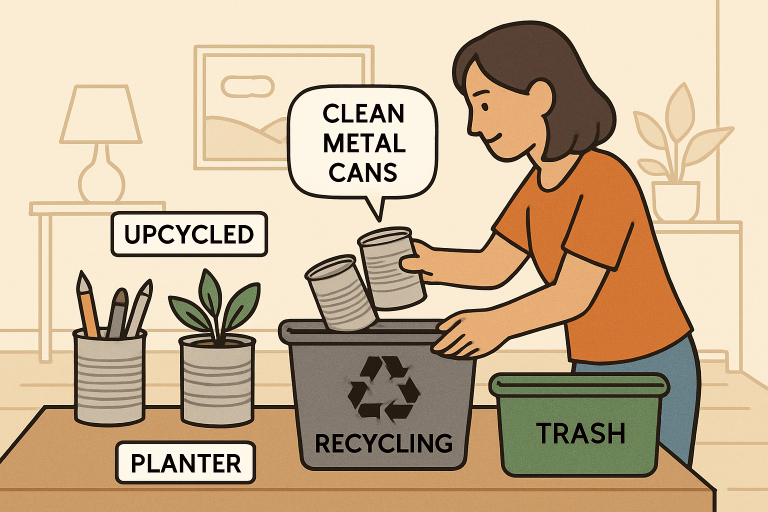Smart Ways to Reduce Metal Waste at Home
- Opinion
- August 18, 2025
- No Comment
Reducing metal waste at home conserves valuable resources and actively helps combat pollution and lower landfill dependency. Homeowners have an essential role by choosing sustainable habits, utilizing community recycling initiatives, and supporting mindful purchasing. One practical approach is to learn more about local services, such as waste management Chula Vista, CA, which provide resources and solutions to streamline your household waste routine and promote recycling in your community. Small changes can make a substantial difference if you’re looking to enhance everyday recycling habits or explore creative upcycling projects. Focusing on how you handle and dispose of metal objects will help you and your household leave a lighter environmental footprint. Below, discover practical steps for managing metal waste at home, from establishing recycling routines to leveraging cutting-edge smart home technology.
Contents
Recycling Metal Items
Start your metal waste reduction journey with household recycling. Items such as aluminum soda cans, steel packaging tins, used aerosol containers, and outdated cookware are commonly recyclable. Ensure any metal products you recycle are cleaned and separated from non-metal components, such as plastic lids or packaging. Doing so enables municipal and private recycling facilities to process these materials efficiently, preventing contamination. According to the U.S. Environmental Protection Agency, recycling metals such as aluminum conserves over 90% of the energy required to produce new metals from raw ore.
Upcycling and Repurposing
If recycling isn’t immediately possible, consider repurposing metal objects through upcycling. Repurposing reduces the demand on recycling systems and extends a product’s lifecycle. Turn empty tin cans into creative planters, transform old metal pipes into quirky shelves, or reshape worn-out cooking utensils into kitchen hooks or decorative items. Upcycling projects are accessible to families and can inspire children to see the value in sustainable practices, reinforcing skills like problem-solving and creativity.
Proper Disposal Methods
Certain metal items, including batteries and electronics, contain hazardous substances and valuable metals like copper and gold. These should never be tossed in household bins. Instead, locate specialized drop-off centers or community hazardous waste collection events for safe and environmentally sound disposal. Properly disposed of, these items contribute to a more robust circular economy by enabling the recovery of precious metals, decreasing the need for environmentally damaging mining practices. The National Geographic e-waste guide explains how responsible disposal aids public health and environmental protection.
Maintaining Metal Products
Caring for metal products extends their valuable lives and delays their journey to the landfill or recycling center. Keep metal furniture, tools, and appliances rust-free by storing them in dry areas and applying protective coatings when needed. Routine cleaning, especially for outdoor or kitchen metals, and immediate repairs can prevent deterioration and ensure items serve your family longer. For example, touching up chipped cookware with food-safe coatings or protecting garden tools with oil can save money and reduce waste.

Reducing Metal Use
Conscious purchasing is another effective way to limit household metal waste. Seek out items packaged with less or no metal, and favor products made from recycled or reclaimed metals. Consider alternatives, like glass or sturdy plastics, when appropriate. Supporting brands that invest in sustainable sourcing and recycled materials lowers resource extraction and overall waste. Purchasing from furniture producers or manufacturers focused on reclaimed or recycled metal supports larger industry sustainability efforts.
Participating in Community Programs
Communities often offer recycling drives, metal collection events, or ongoing drop-off services for scrap metal and hazardous waste. Take advantage of these programs for materials that can’t be recycled curbside but still hold value, such as old grills, rusty tools, or broken bicycles. Using local collection services, you help ensure that metals re-enter the manufacturing loop effectively and don’t contribute to landfills unnecessarily.
Educating Household Members
Education is crucial for effective waste reduction. Share information about metal recycling and upcycling with household members, and encourage everyone to participate in sorting, cleaning, and creatively reusing metal. Involve children in simple upcycling projects or teach them why separating metals is essential at home. Families that embrace sustainable practices build lasting habits and foster environmental awareness for future generations.
Leveraging Smart Home Technologies
Advances in smart home devices are making waste management more efficient than ever. Smart recycling bins with fill sensors offer timely reminders for sorting and taking items to the proper facility. At the same time, some appliances are engineered for long-term use and easy part replacement, reducing waste by design. Integrating these technologies into the home streamlines recycling tasks and supports consistent participation from busy families.
Reducing metal waste at home is a collaborative process that relies on informed choices, community engagement, and a willingness to adopt new habits. Using creative upcycling and proper disposal protocols, you can help create a cleaner, more sustainable environment for your family and community.

